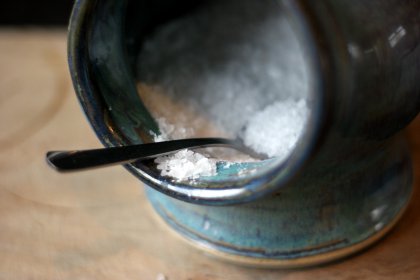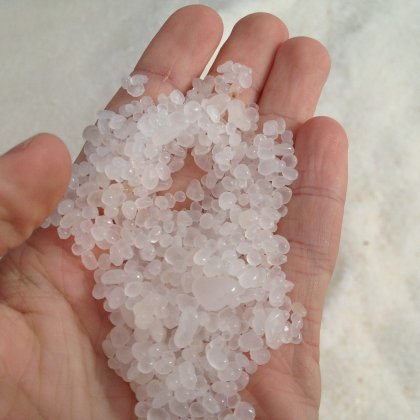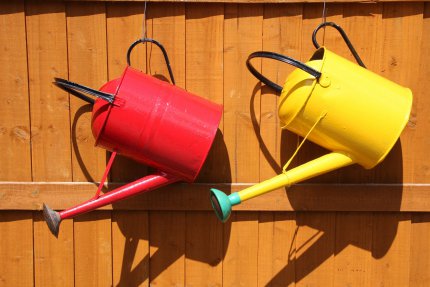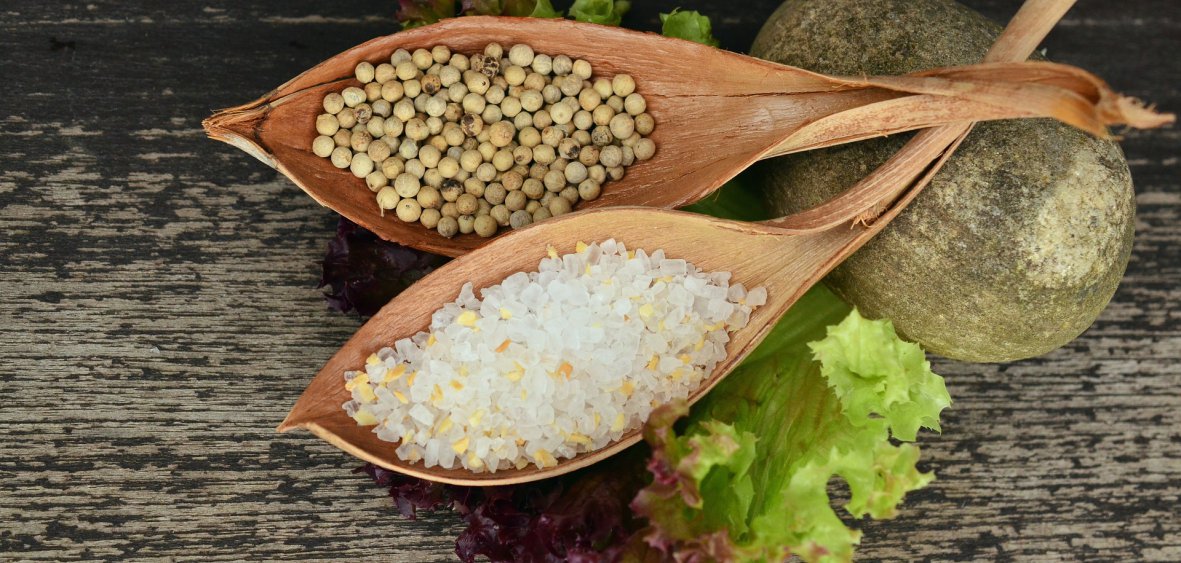 Epsom salt is a salt of sulfur and magnesium (magnesium sulphate heptahydrate), it has a similar effect as magnesium chloride. Instead of chloride, sulphur is present in its composition. This one has a great effect on hair, nails and skin. Epsom salt is also known as bitter salt, Epsomite salt, Epsomite or English salt. This salt has a bitter taste and is odourless.
Epsom salt is a salt of sulfur and magnesium (magnesium sulphate heptahydrate), it has a similar effect as magnesium chloride. Instead of chloride, sulphur is present in its composition. This one has a great effect on hair, nails and skin. Epsom salt is also known as bitter salt, Epsomite salt, Epsomite or English salt. This salt has a bitter taste and is odourless.
Epsom salt effectively detoxifies, has anti-inflammatory and antibacterial properties. Epsomite helps to care for beauty, relaxes, provides us with a young appearance, also has an impact on seborrhea inhibition.
Effects of magnesium and sulphur on health
 The beneficial effects of magnesium have already been extensively described by us. It soothes the nervous system, ensures good condition of blood vessels and heart, increases immunity and many others. Its absorption by the body is limited, so it is worth looking for alternative ways to supply it in sufficient quantity, such as the consumption of magnesium chloride. As experience has shown, magnesium is more easily assimilated through the skin than by taking it, for example in the form of tablets.
The beneficial effects of magnesium have already been extensively described by us. It soothes the nervous system, ensures good condition of blood vessels and heart, increases immunity and many others. Its absorption by the body is limited, so it is worth looking for alternative ways to supply it in sufficient quantity, such as the consumption of magnesium chloride. As experience has shown, magnesium is more easily assimilated through the skin than by taking it, for example in the form of tablets.
Sulfur supports our beauty. It prevents keratosis of the epidermis, takes care of the scalp, hair and nails. Helps people struggling with dandruff. Sulphur also affects joint health.
In addition, sulphur compounds are involved in binding and removing heavy metals from the body. This is an extremely important function at a time when we are struggling with a very polluted environment.
Sulphur compounds interact with selenomethionine, vitamin C, magnesium and zinc. They help the body to produce glutathione and molecules capturing ions of toxic metals, called metallothionines.
How can I use Epsonian salt for a healthier life?
Epsonian salt was produced centuries ago. Its name comes from the English town of Epsom. It was there that it was obtained by evaporating water from springs. For centuries this salt has been used for various purposes.
How is the properties of Epsonian salt used today?
Internally, it is used as a laxative. Flat tablespoon of Epom salt in a glass of lukewarm water. Drinking the solution is not a pleasure due to its specific taste. As an agent, Epsomite is very effective. Magnesium sulphate has water binding properties in the intestines.
It is worth remembering about the Epsonian salt before examinations and treatments requiring prior bowel movements and cleansing of the digestive tract.
Remember that Epsom salt can be used on an ad hoc basis, in exceptional situations. In order to ensure a constant and correct defecation, you should follow a diet rich in fiber.
 2. Epsom salt perfectly soothes sore muscles and removes fatigue. It also copes well with headaches. To achieve this effect, add 2 glasses of Epsom salt to a bath filled with warm water. In such a prepared bath it is enough to spend about 15 - 20 minutes to feel relaxed.
2. Epsom salt perfectly soothes sore muscles and removes fatigue. It also copes well with headaches. To achieve this effect, add 2 glasses of Epsom salt to a bath filled with warm water. In such a prepared bath it is enough to spend about 15 - 20 minutes to feel relaxed.
Moments spent in the bathtub, can be additionally enriched with essential oil. A bath should be prepared shortly before bedtime, because the deep relaxation that it provides favors fast falling asleep.
A bath with the addition of Epsom is also recommended for children, but one should be careful with the choice and amount of essential oils applied, due to the sometimes too strong effect of these substances.
3. Epsom is a good means of alleviating the effects of mosquito bites. To do this, dissolve 2 tablespoons of Epson salt in a glass of water. In the solution, the gauze is soaked and the bite is wrapped.
4. the Epsonian salt is used for sunburn. When irritated by the sun, the skin is sprayed with a previously prepared solution, prepared in the same way as the agent for mosquito bites.
5. Epsom Salt Solution helps to remove splinters from the skin. The place where the splinter is stuck is soaked in brine and only after such a bath is the intruder removed.
6. removing swelling of the feet is another application of Epsonian salt. Add a few spoonfuls of salt to a bowl of warm water. After bathing in the solution, swelling and tiredness of the feet disappears. This solution is also used in case of pain caused by dislocations and bruises.
7. a similar mixture is useful in removing mycosis from the feet. Soaking should last about 10 - 15 minutes, 3 times a day. If we are troubled by the unpleasant smell of our feet, it is also worth to use such a bath every day. In this case it is enough to do it once a day.
 8. Epsom salt can be used as a body peeling cosmetic. A handful of this specificity, mixed with oil or coconut oil. You can also add a few drops of essential oil.
8. Epsom salt can be used as a body peeling cosmetic. A handful of this specificity, mixed with oil or coconut oil. You can also add a few drops of essential oil.
9. bitter salt is also suitable for face scrubbing. Mix half a teaspoon of Epsom salt with oil, face wash gel. Peeling with the content of Epsonian salt, including sulphur, has anti-acne, anti-bacterial and anti-seborrhoea effects.
An interesting proposal may be a combination of peeling and mask in one specificity. To do this, mix the Epsonian salt with honey (in equal proportions). Apply the mixture for 15 - 20 minutes on a washed face. Finally, massage the face and rinse the mask. The massage should be gentle, so as not to irritate the skin, but only to cleanse and nourish it.
10. sulfur perfectly cares for the hair. To improve their health and beauty, mix natural hair balm with Epson salt (in equal proportions). Place the mixture on damp hair, slightly wiped with a towel and leave it for about 20 minutes. After this time we rinse the whole. The mask increases the volume of the hair, it also has an anti-seborrhea and anti-dandruff effect. It is also a great antibacterial agent.
11. epson salt helps in housekeeping. It is useful, among other things, as a cleaning agent for tiles and joints. To clean ceramic tiles or terracotta, mix salt and dishwashing liquid.
Another application is the use of Epsom for washing as a softener. In order for the salt to fulfill its purpose, we add to 1 glass of Epsom salt about 5 drops of essential oil with a selected smell. The preparation is sufficient for 4 washes, as each time about ¼ of a glass of mixture is added.
 13. Epsonian salt is also versatile in the garden. It is used, among other things, to fertilize the soil due to its high magnesium content. Magnesium, on the other hand, is a part of chlorophyll. Fertilizer especially helps when plants (conifers or grass) start to turn brown. It also supports the growth of flowers and vegetables. It can also be used to fertilize the soil in pots. For this purpose, from time to time a spoonful of salt (for 2 litres of water) should be added to the water.
13. Epsonian salt is also versatile in the garden. It is used, among other things, to fertilize the soil due to its high magnesium content. Magnesium, on the other hand, is a part of chlorophyll. Fertilizer especially helps when plants (conifers or grass) start to turn brown. It also supports the growth of flowers and vegetables. It can also be used to fertilize the soil in pots. For this purpose, from time to time a spoonful of salt (for 2 litres of water) should be added to the water.
14. salting plants and saving them from the oppression of snails.
15. spraying the salt solution of plants, both garden and pot plants, prevents the appearance of any pests.















